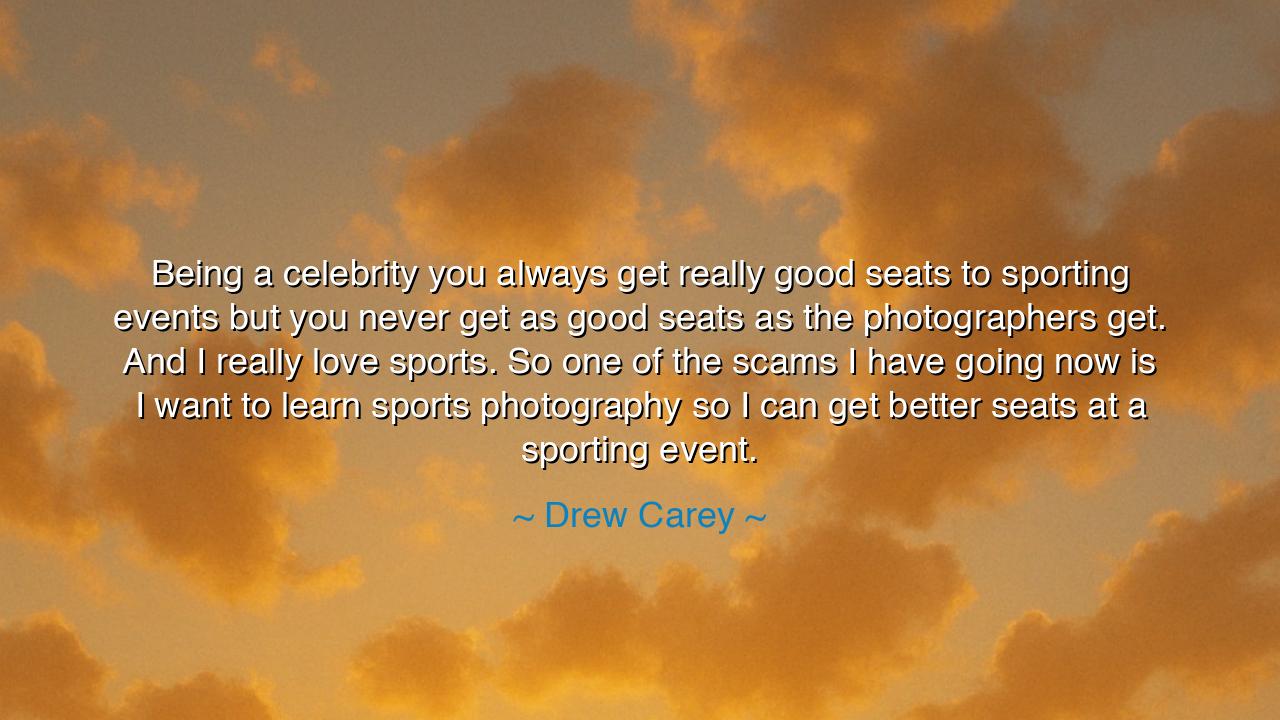
Being a celebrity you always get really good seats to sporting
Being a celebrity you always get really good seats to sporting events but you never get as good seats as the photographers get. And I really love sports. So one of the scams I have going now is I want to learn sports photography so I can get better seats at a sporting event.






Drew Carey, with a voice both humorous and wise, once said: “Being a celebrity you always get really good seats to sporting events but you never get as good seats as the photographers get. And I really love sports. So one of the scams I have going now is I want to learn sports photography so I can get better seats at a sporting event.” At first hearing, these words seem playful, a jest born of wit. Yet within them lies a deeper lesson, wrapped in laughter: that true passion will always seek a way closer to its source, and that ingenuity, not privilege, often grants us the truest rewards.
At the heart of Carey’s words is his love of sports. Though fame grants him wealth and access, he is still, at his core, like every other fan—longing to be as close as possible to the energy of the field, the crack of the bat, the rush of the court. This yearning is universal. For whether we are kings in palaces or workers in the stands, the human heart desires not distance but nearness, not detachment but immersion. His humor cloaks a truth: passion demands intimacy, and those who love something will always seek to draw nearer.
Carey’s solution—to study sports photography—is more than a joke. It reveals the power of creativity and adaptability. Instead of lamenting what he cannot have, he looks for a way to enter the very world that stands between him and the action. In this he mirrors the wisdom of the ancients: when the door of privilege is closed, skill and craft can open another. To wield a camera becomes not merely a profession, but a bridge between desire and fulfillment.
History offers a parallel in the tale of Herodotus, the ancient historian. Though not a king, nor a general, he longed to stand close to the great events of his time. And so he chose the craft of writing, weaving tales and chronicles that allowed him to sit, in spirit, among rulers and armies. His pen, like Carey’s imagined camera, became the instrument that brought him near to the heartbeat of history. The lesson is timeless: when passion drives you, learn the skills that carry you closer to the source of your love.
But Carey’s words also strike against the illusion of celebrity. Fame grants many privileges, yet it does not grant everything. There are always places reserved for those who labor in craft rather than bask in status. The photographer’s seat, closer even than the celebrity’s, belongs to the worker who brings skill, patience, and vision. Thus, Carey reminds us—whether knowingly or playfully—that honor and closeness are not always bought by wealth or fame, but by devotion to the craft itself.
The lesson for us is this: when you long for something, do not wait for privilege to deliver it to you. Instead, learn, adapt, and take up the tools that bring you closer. If you love the game, perhaps become a coach, a writer, a photographer, a builder of the field itself. If you love art, do not simply stand in galleries—pick up the brush. If you love music, do not only listen—learn to play. For it is not passive adoration, but active participation, that places us closest to the heart of what we love.
So I say to you: let Drew Carey’s jest become your wisdom. Do not be content with good seats when your heart longs for the best. Do not rely on status, but on skill. Become a participant in the things you love, and let your passion guide you to mastery. For in this way, you will not merely watch life from the stands—you will stand upon the field itself, closer to the action, closer to the truth, closer to the flame of what moves your soul.






AAdministratorAdministrator
Welcome, honored guests. Please leave a comment, we will respond soon